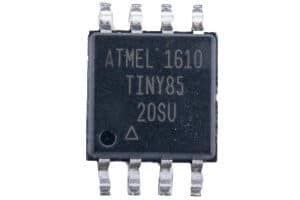For an upcoming project I need and Arduino. Arduino is awesome. The boards are solid, the programming language and IDE are easy, and the community is awesome. But for a lot of electronics projects, an standard Arduino is overkill. If you’re just blinking a few LEDs, and reading a single sensor, you can get the job done smaller and cheaper using a simple IC, like the ATtiny85.

attiny85
Unfortunately, the ATtiny85 doesn’t have a well-known, ubiquitous development platform like Arduino’s Uno or Leonardo. And 8kB of program space doesn’t leave much room for a bootloader, so an extra programmer is usually required. On top of that, standard Arduino doesn’t support the chip. That doesn’t mean programming the ATtiny85 in Arduino isn’t possible, though!

The high-performance, low-power Microchip 8-bit AVR RISC-based microcontroller combines 8KB ISP flash memory, 512B EEPROM, 512-Byte SRAM, 6 general purpose I/O lines, 32 general purpose working registers, one 8-bit timer/counter with compare modes, one 8-bit high speed timer/counter, USI, internal and external Interrupts, 4-channel 10-bit A/D converter, programmable watchdog timer with internal oscillator, three software selectable power saving modes, and debug Wire for on-chip debugging. The device achieves a throughput of 20 MIPS at 20 MHz and operates between 2.7-5.5 volts.
By executing powerful instructions in a single clock cycle, the device achieves throughputs approaching 1 MIPS per MHz, balancing power consumption and processing speed.
Specifications
| Program Memory Type | Flash |
| Program Memory Size (KB) | 8 |
| CPU Speed (MIPS/DMIPS) | 20 |
| SRAM Bytes | 512 |
| Data EEPROM/HEF (bytes) | 512 |
| Digital Communication Peripherals | 1-SPI, 1-I2C |
| Capture/Compare/PWM Peripherals | 5PWM |
| Timers | 2 x 8-bit |
| Number of Comparators | 1 |
| Temperature Range (C) | -40 to 85 |
| Operating Voltage Range (V) | 1.8 to 5.5 |
| Pin Count | 8 |